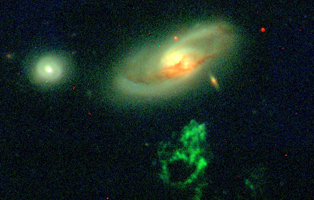Cosmic Curiosity Reveals Ghostly Glow of Dead Quasar

The green Voorwerp in the foreground remains illuminated by light emitted up to 70,000 years ago by a quasar in the center of the background galaxy, which has since died out. Image credit: WIYN/William Keel/Anna Manning
While sorting through hundreds of galaxy images as part of the Galaxy Zoo citizen science project two years ago, Dutch schoolteacher and volunteer astronomer Hanny van Arkel stumbled upon a strange-looking object that baffled professional astronomers. Two years later, a team led by Yale University researchers has discovered that the unique object represents a snapshot in time that reveals surprising clues about the life cycle of black holes.
In a new study, the team has confirmed that the unusual object, known as Hanny’s Voorwerp (Hanny’s “object” in Dutch), is a large cloud of glowing gas illuminated by the light from a quasar-an extremely energetic galaxy with a supermassive black hole at its center. The twist, described online in the Astrophysical Journal Letters, is that the quasar lighting up the gas has since burned out almost entirely, even though the light it emitted in the past continues to travel through space, illuminating the gas cloud and producing a sort of “light echo” of the dead quasar. (more…)
